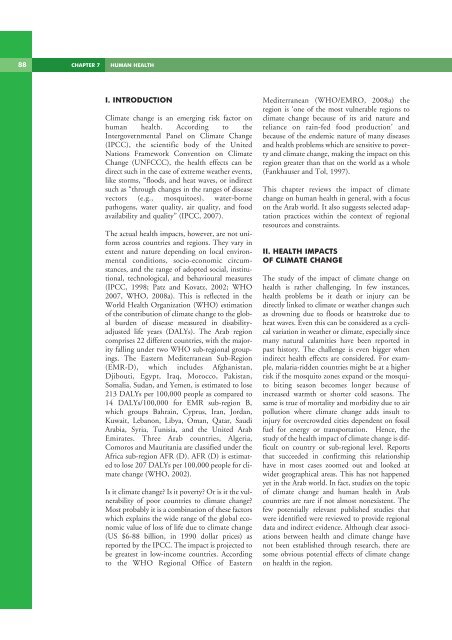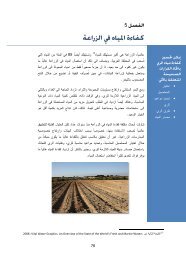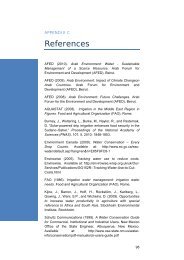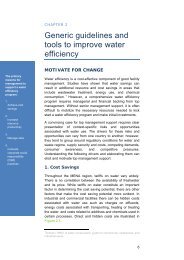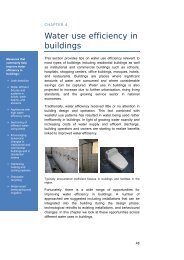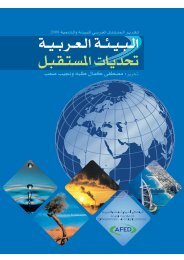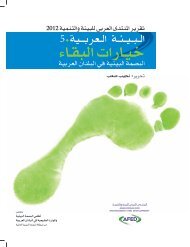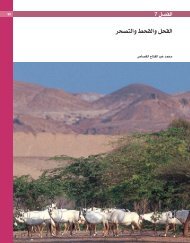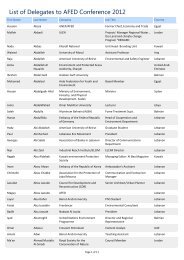Impact of Climate Change on Arab Countries - (IPCC) - Working ...
Impact of Climate Change on Arab Countries - (IPCC) - Working ...
Impact of Climate Change on Arab Countries - (IPCC) - Working ...
You also want an ePaper? Increase the reach of your titles
YUMPU automatically turns print PDFs into web optimized ePapers that Google loves.
88<br />
CHAPTER 7<br />
HUMAN HEALTH<br />
I. INTRODUCTION<br />
<str<strong>on</strong>g>Climate</str<strong>on</strong>g> change is an emerging risk factor <strong>on</strong><br />
human health. According to the<br />
Intergovernmental Panel <strong>on</strong> <str<strong>on</strong>g>Climate</str<strong>on</strong>g> <str<strong>on</strong>g>Change</str<strong>on</strong>g><br />
(<strong>IPCC</strong>), the scientific body <str<strong>on</strong>g>of</str<strong>on</strong>g> the United<br />
Nati<strong>on</strong>s Framework C<strong>on</strong>venti<strong>on</strong> <strong>on</strong> <str<strong>on</strong>g>Climate</str<strong>on</strong>g><br />
<str<strong>on</strong>g>Change</str<strong>on</strong>g> (UNFCCC), the health effects can be<br />
direct such in the case <str<strong>on</strong>g>of</str<strong>on</strong>g> extreme weather events,<br />
like storms, “floods, and heat waves, or indirect<br />
such as “through changes in the ranges <str<strong>on</strong>g>of</str<strong>on</strong>g> disease<br />
vectors (e.g., mosquitoes), water-borne<br />
pathogens, water quality, air quality, and food<br />
availability and quality” (<strong>IPCC</strong>, 2007).<br />
The actual health impacts, however, are not uniform<br />
across countries and regi<strong>on</strong>s. They vary in<br />
extent and nature depending <strong>on</strong> local envir<strong>on</strong>mental<br />
c<strong>on</strong>diti<strong>on</strong>s, socio-ec<strong>on</strong>omic circumstances,<br />
and the range <str<strong>on</strong>g>of</str<strong>on</strong>g> adopted social, instituti<strong>on</strong>al,<br />
technological, and behavioural measures<br />
(<strong>IPCC</strong>, 1998; Patz and Kovatz, 2002; WHO<br />
2007, WHO, 2008a). This is reflected in the<br />
World Health Organizati<strong>on</strong> (WHO) estimati<strong>on</strong><br />
<str<strong>on</strong>g>of</str<strong>on</strong>g> the c<strong>on</strong>tributi<strong>on</strong> <str<strong>on</strong>g>of</str<strong>on</strong>g> climate change to the global<br />
burden <str<strong>on</strong>g>of</str<strong>on</strong>g> disease measured in disabilityadjusted<br />
life years (DALYs). The <strong>Arab</strong> regi<strong>on</strong><br />
comprises 22 different countries, with the majority<br />
falling under two WHO sub-regi<strong>on</strong>al groupings.<br />
The Eastern Mediterranean Sub-Regi<strong>on</strong><br />
(EMR-D), which includes Afghanistan,<br />
Djibouti, Egypt, Iraq, Morocco, Pakistan,<br />
Somalia, Sudan, and Yemen, is estimated to lose<br />
213 DALYs per 100,000 people as compared to<br />
14 DALYs/100,000 for EMR sub-regi<strong>on</strong> B,<br />
which groups Bahrain, Cyprus, Iran, Jordan,<br />
Kuwait, Leban<strong>on</strong>, Libya, Oman, Qatar, Saudi<br />
<strong>Arab</strong>ia, Syria, Tunisia, and the United <strong>Arab</strong><br />
Emirates. Three <strong>Arab</strong> countries, Algeria,<br />
Comoros and Mauritania are classified under the<br />
Africa sub-regi<strong>on</strong> AFR (D). AFR (D) is estimated<br />
to lose 207 DALYs per 100,000 people for climate<br />
change (WHO, 2002).<br />
Is it climate change Is it poverty Or is it the vulnerability<br />
<str<strong>on</strong>g>of</str<strong>on</strong>g> poor countries to climate change<br />
Most probably it is a combinati<strong>on</strong> <str<strong>on</strong>g>of</str<strong>on</strong>g> these factors<br />
which explains the wide range <str<strong>on</strong>g>of</str<strong>on</strong>g> the global ec<strong>on</strong>omic<br />
value <str<strong>on</strong>g>of</str<strong>on</strong>g> loss <str<strong>on</strong>g>of</str<strong>on</strong>g> life due to climate change<br />
(US $6-88 billi<strong>on</strong>, in 1990 dollar prices) as<br />
reported by the <strong>IPCC</strong>. The impact is projected to<br />
be greatest in low-income countries. According<br />
to the WHO Regi<strong>on</strong>al Office <str<strong>on</strong>g>of</str<strong>on</strong>g> Eastern<br />
Mediterranean (WHO/EMRO, 2008a) the<br />
regi<strong>on</strong> is ‘<strong>on</strong>e <str<strong>on</strong>g>of</str<strong>on</strong>g> the most vulnerable regi<strong>on</strong>s to<br />
climate change because <str<strong>on</strong>g>of</str<strong>on</strong>g> its arid nature and<br />
reliance <strong>on</strong> rain-fed food producti<strong>on</strong>’ and<br />
because <str<strong>on</strong>g>of</str<strong>on</strong>g> the endemic nature <str<strong>on</strong>g>of</str<strong>on</strong>g> many diseases<br />
and health problems which are sensitive to poverty<br />
and climate change, making the impact <strong>on</strong> this<br />
regi<strong>on</strong> greater than that <strong>on</strong> the world as a whole<br />
(Fankhauser and Tol, 1997).<br />
This chapter reviews the impact <str<strong>on</strong>g>of</str<strong>on</strong>g> climate<br />
change <strong>on</strong> human health in general, with a focus<br />
<strong>on</strong> the <strong>Arab</strong> world. It also suggests selected adaptati<strong>on</strong><br />
practices within the c<strong>on</strong>text <str<strong>on</strong>g>of</str<strong>on</strong>g> regi<strong>on</strong>al<br />
resources and c<strong>on</strong>straints.<br />
II. HEALTH IMPACTS<br />
OF CLIMATE CHANGE<br />
The study <str<strong>on</strong>g>of</str<strong>on</strong>g> the impact <str<strong>on</strong>g>of</str<strong>on</strong>g> climate change <strong>on</strong><br />
health is rather challenging. In few instances,<br />
health problems be it death or injury can be<br />
directly linked to climate or weather changes such<br />
as drowning due to floods or heatstroke due to<br />
heat waves. Even this can be c<strong>on</strong>sidered as a cyclical<br />
variati<strong>on</strong> in weather or climate, especially since<br />
many natural calamities have been reported in<br />
past history. The challenge is even bigger when<br />
indirect health effects are c<strong>on</strong>sidered. For example,<br />
malaria-ridden countries might be at a higher<br />
risk if the mosquito z<strong>on</strong>es expand or the mosquito<br />
biting seas<strong>on</strong> becomes l<strong>on</strong>ger because <str<strong>on</strong>g>of</str<strong>on</strong>g><br />
increased warmth or shorter cold seas<strong>on</strong>s. The<br />
same is true <str<strong>on</strong>g>of</str<strong>on</strong>g> mortality and morbidity due to air<br />
polluti<strong>on</strong> where climate change adds insult to<br />
injury for overcrowded cities dependent <strong>on</strong> fossil<br />
fuel for energy or transportati<strong>on</strong>. Hence, the<br />
study <str<strong>on</strong>g>of</str<strong>on</strong>g> the health impact <str<strong>on</strong>g>of</str<strong>on</strong>g> climate change is difficult<br />
<strong>on</strong> country or sub-regi<strong>on</strong>al level. Reports<br />
that succeeded in c<strong>on</strong>firming this relati<strong>on</strong>ship<br />
have in most cases zoomed out and looked at<br />
wider geographical areas. This has not happened<br />
yet in the <strong>Arab</strong> world. In fact, studies <strong>on</strong> the topic<br />
<str<strong>on</strong>g>of</str<strong>on</strong>g> climate change and human health in <strong>Arab</strong><br />
countries are rare if not almost n<strong>on</strong>existent. The<br />
few potentially relevant published studies that<br />
were identified were reviewed to provide regi<strong>on</strong>al<br />
data and indirect evidence. Although clear associati<strong>on</strong>s<br />
between health and climate change have<br />
not been established through research, there are<br />
some obvious potential effects <str<strong>on</strong>g>of</str<strong>on</strong>g> climate change<br />
<strong>on</strong> health in the regi<strong>on</strong>.


